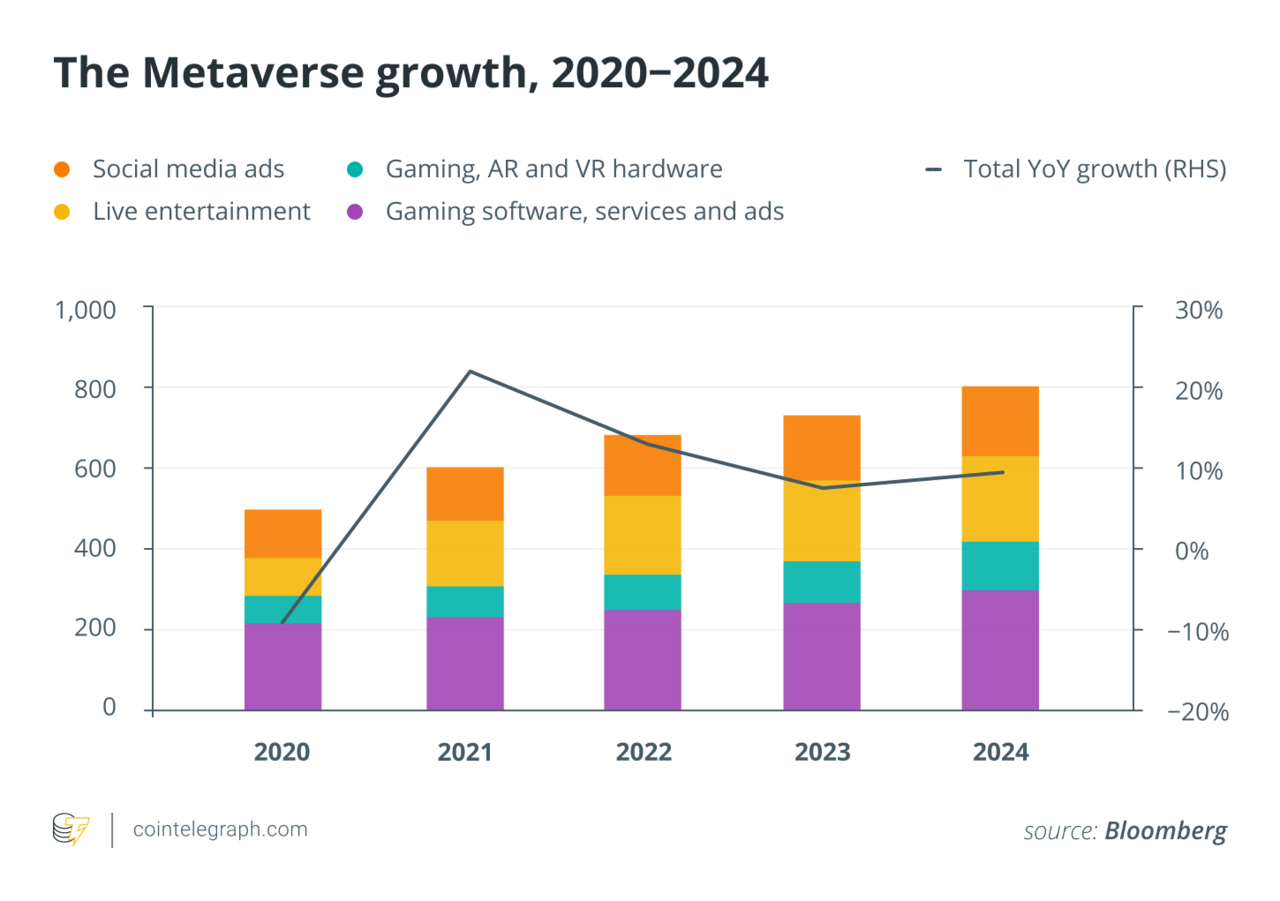
The Metaverse: Will it be a decentralized haven or a centralized tyranny?
Facebook is looking to seize control of the Metaverse, but a blockchain-based counterattack has already been mounted.
Last week, Facebook rebranded to Meta and announced its plans to kickstart the development of the Metaverse — an entirely new way of interacting and navigating the internet. Now, the Metaverse landscape has a multi-billion dollar corporate behemoth vying for the helm, which has made its future all the more uncertain.
Whether we like it or not, major corporations will likely play a major role in how the Metaverse develops and evolves. But will it be plagued by the same problems faced by today’s social media giants, or will decentralized platforms and services take center stage?
Building a digital walled garden
At last week’s Facebook Connect conference, Meta founder and CEO Mark Zuckerberg announced plans to spend $10 billion this year alone on the development of the Metaverse — an ecosystem of interconnected digital experiences, services and platforms that seamlessly blend with the real world.
But as Facebook has shown time and time again — such as when it backpedaled on its pledge to not require a Facebook account to use its Oculus products — it will almost certainly look to enforce strict controls on how the Metaverse is used and accessed. After all, ecosystem lock-ins are a popular, tried-and-tested way to force continued engagement while isolating the competition.
Given that Zuckerberg himself billed the Metaverse as the “next generation of the internet” that will be used by hundreds of millions of users, it seems unlikely that a corporate goliath with shareholders to please won’t do everything in its power behind the scenes to position Meta at the center of the Metaverse.
As a vast, upcoming landscape that will without a doubt introduce new ways to create, socialize and work online, the Metaverse stands to become a ubiquitous medium that most internet-savvy individuals will interact with to some degree.
Likewise, given the recent release of the damning “Facebook Files” by The Wall Street Journal, it has been revealed that the social media platform has been suffering from a whole plethora of issues and operating with some seriously dubious business practices — ranging from a huge lawsuit to lax content moderation to the preferential treatment of certain users. All of which is in stark contrast to Zuckerberg’s supposed egalitarian vision for the Metaverse.
If the Metaverse is made in Facebook’s image, count me out.
These documents also show that Facebook is rapidly losing favor among millennials — the generation most likely to interact with Metaverse technologies.
Meta has already been widely slammed for its plans and was recently labeled a “cancer to democracy” by American politician Alexandria Ocasio-Cortez in a recent Twitter lashing. This sentiment appears to be the general consensus on Crypto Twitter, which didn’t react favorably to the news.
The game is rigged and it’s not in your favor. Meta wants to own your digital identity, and given its way, it will have access to more of your data than ever before. No, thank you!
The blockchain catapult
Blockchain is widely expected to become one of the key technologies enabling the development of a truly pervasive virtual space that can be navigated just as securely as the Web 2.0 internet.
Thanks to blockchain-powered digital identity solutions that will power truly persistent digital avatars, along with digital assets that provide region-agnostic access to services and products, the Metaverse looks set to inherit the values that the blockchain industry was founded on — namely, permissionless access, censorship resistance, security and decentralization.
Nonetheless, tech incumbents will eventually look to muscle in on the blockchain infrastructure side of things in an attempt to direct the development of the Metaverse and shape it in their own image. After all, given that the Metaverse industry is slated to grow at a compound annual growth rate of 13.1% over the next few years, while the blockchain technology sector is projected to soar by 32.4% until at least 2025, there is a strong financial incentive to establish an early foothold.

Twitter is set to be one of the first to get in on the action with Bluesky, a decentralized social media protocol that will eventually be used to host a variety of social networks — Twitter included. However, given that Twitter too has been subject to more than its fair share of controversies, including dubious account suspensions, high-profile account hijackings, and numerous reports of government censorship, it isn’t so clear-cut as to whether this will support the aforementioned core tenets.
Not to mention the fact that Twitter (and many other social media platforms) are banned in several countries. And as we have seen before with Facebook’s Novi wallet product, corporate crypto projects tend to attract excessive regulatory scrutiny, often severely restricting their scope and eventually resulting in a watered-down product, wherein the balance between profit and progress is often skewed to the former.
A range of crypto-native social media platforms and metaverse projects are currently in development and arguably have a major head-start and technical advantage over corporate-backed offerings in that they can remain truly permissionless and democratic. This includes the likes of Decentraland and Bloktopia — which already provide an early view into what the Metaverse could be through their complex, user-controlled economies, virtual real estate and digital VR-based digital experiences.
Given its potential to radically change the way we interact with one another and go about our daily lives, the Metaverse is shaping up to be a pivotal technology for all of us.
But with corporate giants set to clash with the motivated and resourceful blockchain community over the development and nature of the Metaverse, it is still unclear whether it will be yet another tool designed to exploit the masses or the promised land we all want.










